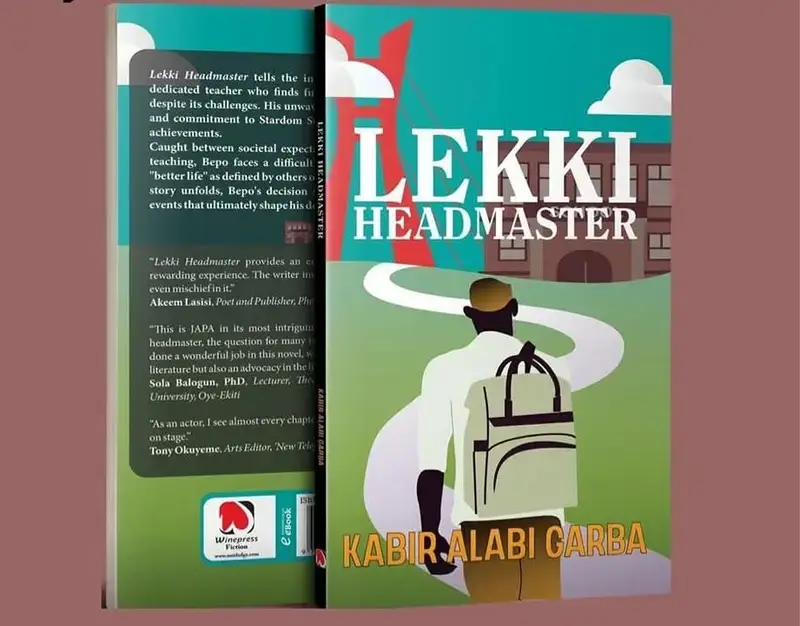In Lekki Headmaster, Kabiru Alabi Garba crafts a compelling narrative about the challenges and triumphs of a school headmaster in a rapidly developing Nigerian city. The characters in the novel, each complex in their own way, reflect different aspects of Nigerian society—from the noble struggles of an idealistic educator to the corrupt systems he must navigate. This article will break down the key characters in the story, exploring their roles, motivations, and developments throughout the plot.
Understanding these characters is essential for grasping the broader themes of education, corruption, socio-economic divides, and leadership that Garba so deftly explores in this work.
1. The Headmaster (Protagonist)
The headmaster of the school is the central character in the novel. He is an idealistic man, passionate about providing quality education and making a meaningful difference in his students’ lives. His strong moral compass and commitment to education often put him at odds with the corrupt and inefficient systems in place around him.
Character Traits:
- Idealistic: The headmaster constantly strives to create a school environment that fosters learning, respect, and discipline, despite his numerous challenges.
- Moral Integrity: One of his most defining traits is his resistance to corruption. He refuses to accept bribes or cut corners, even when it could improve his situation.
- Struggles with Leadership: As a leader, he faces constant pressure from both external authorities and internal school politics. His commitment to ethical leadership often makes him feel isolated.
Role in the Story:
The headmaster is the lens through which the reader views the themes of education and integrity. His personal and professional struggles illustrate the harsh realities of leading in a corrupt system. Throughout the novel, he grapples with balancing the needs of his students and the expectations of the broader society.
2. The Teachers (Supporting Characters)
The teachers in the school serve as both allies and antagonists to the headmaster. Some are dedicated and share his ideals, while others are part of the corrupt system he is fighting against.
Key Teachers:
- Mr. Adamu: An older teacher who represents the traditional ways of teaching. He is strict and has a rigid approach to education, often butting heads with the more modern-minded teachers.
- Ms. Chinyere: A young teacher who is progressive and passionate about new teaching methods. She often challenges the headmaster’s traditional approach but ultimately shares his commitment to student welfare.
- Mr. Ojo: A teacher who has been corrupted by the system. He often looks for shortcuts and is easily swayed by bribes and personal gain.
Role in the Story:
The teachers are crucial in highlighting the broader issues within the education system. They mirror different perspectives on education, from traditional to modern, and their actions influence the headmaster’s decisions.
3. The Students (Minor Characters)
The students represent the future of the society in the novel. Their backgrounds, struggles, and potential reflect the possibilities and limitations of Nigerian society.
Key Students:
- Tunde: A bright but troubled student who faces family issues that affect his performance in school. He symbolizes the challenges faced by children in underprivileged environments.
- Amina: A student with an exceptional talent for leadership. Amina’s character arc shows the positive potential of Nigerian youth when given the right education and opportunities.
- Bola: A student from a wealthy background who struggles with his sense of entitlement. His character highlights the disparities between the rich and the poor.
Role in the Story:
The students, though secondary characters, provide insight into the educational system and the impact of socio-economic factors on academic success. Their development throughout the novel mirrors the challenges they face in a divided society.
4. The Politicians (Antagonists)
The politicians in Lekki Headmaster are the embodiment of the corruption and inefficiency that plague Nigerian institutions. They represent the forces that hinder the protagonist’s efforts to bring about change.
Key Politicians:
- Chief Olusola: A corrupt local politician who seeks to control the school system for personal gain. He pressures the headmaster to accept his influence and provides little real support for the school’s development.
- Senator Adebayo: A powerful figure whose interest in the school is driven more by political motives than actual concern for education.
Role in the Story:
The politicians serve as major antagonists who obstruct the headmaster’s progress. They demonstrate how politics often prioritizes personal power over the well-being of the community, contributing to the systemic corruption the headmaster fights against.
5. The Parents (Secondary Characters)
The parents of the students are a varied group, each representing different aspects of Nigerian society. They play an essential role in supporting (or hindering) the headmaster’s vision for the school.
Key Parents:
- Mr. and Mrs. Olayinka: Well-meaning but naïve parents who push their child to succeed, often placing too much pressure on him. They reflect the overbearing expectations many Nigerian parents have for their children’s academic success.
- Auntie Kemi: A single mother who works hard to ensure her child gets a good education, even though she has limited resources. She embodies the struggle of the working-class parent who values education but faces constant financial challenges.
Role in the Story:
The parents’ diverse backgrounds provide a comprehensive view of Nigerian society’s expectations from the education system. Some are supportive, while others are complacent or too demanding, creating further tension for the headmaster as he tries to enact change.
6. The School Board (Supporting Characters)
The school board consists of local figures who have varying levels of involvement in the management of the school. Their role often complicates the headmaster’s job, as some members prioritize personal gain over the success of the institution.
Key Board Members:
- Dr. Adeoye: A member of the school board who advocates for reform and better funding for the school. He becomes an ally of the headmaster but is often overruled by other members who are more interested in maintaining the status quo.
Role in the Story:
The school board’s dynamics reveal the bureaucratic inefficiencies and power struggles within Nigerian institutions. They reflect how institutions that are meant to support education can often become obstacles to progress due to vested interests.
Class Activities
- Character Mapping: Ask students to create a character map, showing the relationships between the headmaster, teachers, students, and politicians. How do each of these characters influence the other?
- Debate on Integrity: Hold a class debate where one side argues that the headmaster should compromise his integrity for the sake of progress, while the other side argues that integrity is essential in leadership.
- Character Interviews: Have students role-play as the headmaster, teachers, or students. They should conduct interviews with each other to understand the motivations behind each character’s actions in the story.
- Case Study Analysis: Choose one character from the book and ask students to write a case study on that character, analyzing their traits, decisions, and the outcomes of those decisions.
- Modern vs. Traditional Education Debate: Host a class discussion on the pros and cons of traditional vs. modern teaching methods, using the headmaster and his teachers as examples.
Class Assignments
- Character Analysis Essay: Write a detailed essay analyzing the character of the headmaster. Discuss his moral dilemmas, leadership challenges, and how he represents the themes of the novel.
- Impact of Corruption: Research the impact of corruption on Nigerian education. Compare the corruption in Lekki Headmaster with real-life issues in Nigerian schools.
- The Role of Politics in Education: Write an essay discussing the role of politics in shaping education policies. Use the portrayal of politicians in the novel as a case study.
- Character Development: Choose one character and write about their personal growth throughout the novel. How do their actions and decisions reflect the overarching themes of the story?
- Real-Life Education System Review: Based on the novel’s portrayal of education in Nigeria, write a report comparing it to the current state of education in your country. Highlight areas of improvement and how the system can be reformed.

